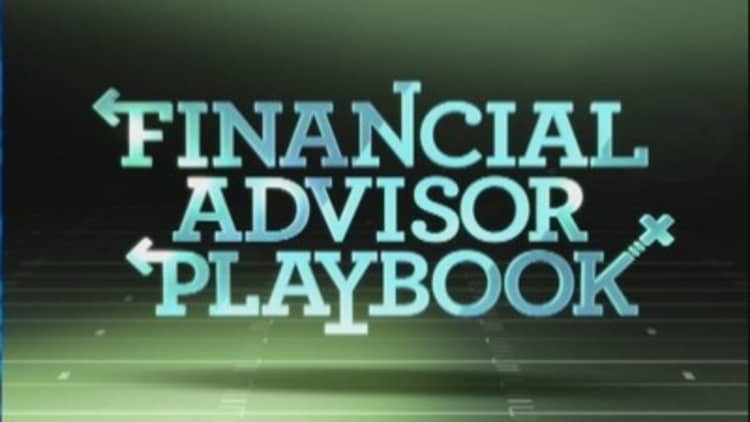It's doubtful most people will notice, let alone celebrate, Friday's 100th anniversary of the U.S. income tax code. But, yes taxpayers, Oct. 4, 2013, is the centennial.
So, happy birthday income tax?
"Obviously, it depends on your perspective," said Ajay Mehrotra, a history professor at Indiana University.
"But there's one thing we can take from the period of time when the tax law passed," he said. "And that is lawmakers got together and realized some permanent form of taxation was needed instead of having a political stalemate that got nowhere."
One expert sees the 100 years as a system run amok.
(Read more: Five key questions for taxpayers)
"In 1913, the tax code consisted of 400 pages," said Timothy Nash, a professor of free market economics at Northwood University.
"By 2012, the tax code was 73,608 pages," he said. "We have gone from a simple tax system to a complex, unfriendly system."
Taxed from the very beginning

It was the 16th Amendment, adopted in February 1913, that gave Congress the legal right to levy an income tax. On the evening of Oct. 3, President Woodrow Wilson signed the Revenue Act of 1913 that allowed the collection of a federal income tax—starting the next day.
But having some sort of taxation goes back to the country's beginning. From 1791 to 1802, the government was supported by tax revenue from the sale of such items as liquor, tobacco, sugar, property sold at auction and even through the sale of slaves.
The high cost of the War of 1812 saw the first sales tax on gold, silverware, jewelry and watches. But by 1817, Congress eliminated all taxes and relied on tariffs from imported goods for revenues.
It was in 1862, to fund the Civil War, that Congress enacted the first income tax. Anyone making between $300 to $10,000 a year paid a rate of 3 percent. That tax ended soon after the war.
Congress also established the Internal Revenue Service at the same time, which had much the same power and authority then as it does now.
Jumping to 1894, Congress passed the first peacetime income tax law, but a year later the Supreme Court declared it unconstitutional. The court said that taxes on rents and real estate income had to be divided among the states according to population, which the law did not allow.
But the court did make a crucial statement in its ruling. It said that Congress had the right to impose a direct income tax—and that led to the passage of the 16th Amendment.
People haven't always hated taxes

As for most people's seemingly contentious relationship with the taxman, Mehrotra said it wasn't always that way.
"It's a popular perception that Americans hate taxes, but that hasn't been the case until recently," he said.
"Taxes in the post-World War II era were very high at a 70 to 80 percent rate in some cases, and people were more or less willing to pay them," he said.
"But our overall prosperity started to decline in the 1960s and '70s, and people wanted to start paying less in taxes," he said.
(Read more: Don't delay year-end financial plans)
"We've had a real transformation of the economy and a loss of faith in the public sector over the years with Watergate, the Vietnam War, so people aren't as supportive of the government and what it does as they used to be," said Mehrotra.
Tax reform unlikely

The tax system has seen its share of changes over the years. In 1943, the withholding tax on wages was introduced for the first time. In 1981, Congress passed the largest tax cut in American history, some $750 billion in cuts over six years. That was partially offset in 1982 and 1984 when Congress raised taxes to the tune of $265 billion.
The Tax Reform Act of 1986 is considered the biggest reform measure since 1913. The top tax rate on individual income was lowered from 50 percent to 28 percent, the lowest it had been since 1916.
But along with the lower rate came the elimination of certain loopholes to make up the lost revenue. And the act put in a $120 billion increase in business taxes.
President George W. Bush signed several tax cuts into law in 2001 for the third-largest tax cut since World War II.President Barack Obama's tax bill for 2013 kept some of the Bush tax cuts for lower incomes but raised levels for higher incomes, which had been reduced under Bush.
Among other moves, Obama restored the full amount of the payroll tax (6.3 percent) and raised the rates on capital gains and included a 3.8 percent surtax on incomes of $200,000 or more for single people to help fund the Affordable Care Act. The dreaded alternative minimum tax (AMT) received a permanent patch to try to keep thousands from having to pay it.
(Read more: After recession, few Americans expect to inherit money)
Calls for tax reform have led to recent hearings on Capitol Hill. Suggestions include going to a flat tax and eliminating deductions like mortgage interest and charitable giving.
"We need a national sales tax or flat rate tax," said Nash. "Both would reduce the complexity and burden of our current system with a fair tax and the opportunity to abolish the IRS."
"It all depends on what you call fair," said Mehrotra, who also supports a national sales tax. "Medicare and Social Security aren't going away, so we need to fund them."
"We need taxation for progressive spending, but one thing that would be helpful is if we stopped trying to run every social policy through the IRS," he added.
"But getting tax reform done won't be easy," he added. "Everyone has a special interest they want to protect."
Hot button issue
Taxes are always a hot button issue. Depending on whose study you look at—or your political persuasion—the U.S. is either the most overtaxed nation on the planet, the least taxed (especially for the wealthy), or it's somewhere in the middle, as some have said.
Wherever it is, taxes are money for government services, like Social Security. Medicare, defense, federal worker payrolls, veterans' benefits, education and health care.
And the amount needed keeps growing. The Treasury Department will likely collect around $4.9 trillion from income and payroll taxes in 2014. That's a huge jump from the $5.4 billion collected in 1920 and the $43 billion in 1945.
If Americans do circle their calendars for taxes, it's usually April 15, the yearly filing day, not the 100th birthday of the federal income tax.
"One hundred years of what we've had has been plenty and it's high time Congress did something about it," said Nash.
—By CNBC's Mark Koba. Follow him on Twitter @MarkKobaCNBC.


